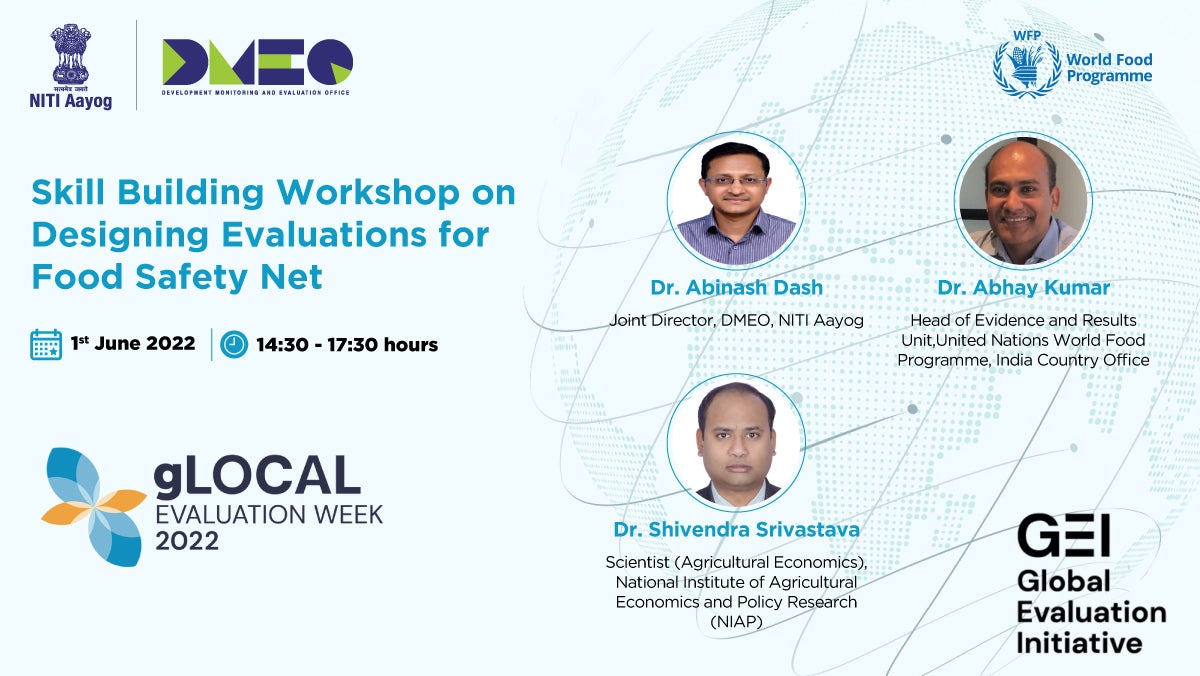Skill-Building Workshop on Designing Evaluations for Food Safety Net Interventions
Workshop
About the Event

Reduction in food insecurity, hunger, and malnutrition plays a pivotal role in achieving sustainable development. Recent evidence finds that the COVID-19 pandemic has slowed down the progress towards achieving Zero Hunger by 2030. Nearly 811 million people faced hunger in 2020. This was 161 million more than in 2019. In response, governments across the globe have implemented new or increased investment in existing mega food safety nets (FSN) to safeguard the poor and vulnerable populations. In India alone, the FSN has been used extensively to deliver subsidized and free dry grains to nearly 800 million beneficiaries. Need of the hour is to strengthen the measurement and tracking of FSNs and provide continuous feedback on outcomes and “what works” to decision-makers.
Knowledge on the various concepts of methods, instruments, and indicators is a necessary pre-condition for choosing the evaluation approach and analysing the situation of a given area. Designs of FSN also vary across settings, ranging from conditional cash transfers to the supply of subsidized dry rations or cooked meals. Hence, information on plausible pathways of change, appropriate evaluation designs and analytical frameworks is needed to help ascertain the effectiveness of FSN.
With this background, the Development Monitoring and Evaluation Office (DMEO) and United Nations World Food Programme (UNWFP) brings together a one-day skill-building-workshop to discuss measurements and evaluations in the food security and nutrition space, with a specific focus on:
● The nature of FSN and their underlying interventions across the globe, with a specific focus on low and middle-income countries
● Feasible pathways of change for various FSN models and interventions
● Evaluation methods, instruments, indicators, and analytical frameworks to effectively measure interventions
● Choosing the right evaluation method, instrument, and analytical framework to assess FSNs in a given area
● Overview of innovations in measuring and tracking food insecurity, hunger, and malnutrition
At the end of the workshop, participants will:
● Improve their understanding of the complex nature of food security and nutrition, and their underlying determinants
● Improve their understanding on the various types of FSN and their underlying pathways of change/ theory of change
● Increase their knowledge on the various evaluation methods, instruments, indicators, and analytical frameworks to evaluate FSN in a given area
● Be able to design an evaluation for a food security and nutrition intervention
Knowledge on the various concepts of methods, instruments, and indicators is a necessary pre-condition for choosing the evaluation approach and analysing the situation of a given area. Designs of FSN also vary across settings, ranging from conditional cash transfers to the supply of subsidized dry rations or cooked meals. Hence, information on plausible pathways of change, appropriate evaluation designs and analytical frameworks is needed to help ascertain the effectiveness of FSN.
With this background, the Development Monitoring and Evaluation Office (DMEO) and United Nations World Food Programme (UNWFP) brings together a one-day skill-building-workshop to discuss measurements and evaluations in the food security and nutrition space, with a specific focus on:
● The nature of FSN and their underlying interventions across the globe, with a specific focus on low and middle-income countries
● Feasible pathways of change for various FSN models and interventions
● Evaluation methods, instruments, indicators, and analytical frameworks to effectively measure interventions
● Choosing the right evaluation method, instrument, and analytical framework to assess FSNs in a given area
● Overview of innovations in measuring and tracking food insecurity, hunger, and malnutrition
At the end of the workshop, participants will:
● Improve their understanding of the complex nature of food security and nutrition, and their underlying determinants
● Improve their understanding on the various types of FSN and their underlying pathways of change/ theory of change
● Increase their knowledge on the various evaluation methods, instruments, indicators, and analytical frameworks to evaluate FSN in a given area
● Be able to design an evaluation for a food security and nutrition intervention
Speakers
| Name | Title | Biography |
|---|---|---|
| Dr. Shivendra Srivastava | Senior Scientist | - |
| Dr. Abhay Kumar | Head- Evidence & Results | - |
| Dr. Abinash Dash | Joint Director | - |